- Remembering Professor William Coleman
- Get onboard with this guide to engaging new talent
- Spring clean your health with employee wellness sessions
- Math invites you to go from AlphaGO to ChatGPT on April 12
- Using quantum technologies to make precise early-stage diagnoses
- There's Something Rotten on the stage at Grebel
Editor:
Brandon Sweet
University Communications
bulletin@uwaterloo.ca
Remembering Professor William Coleman
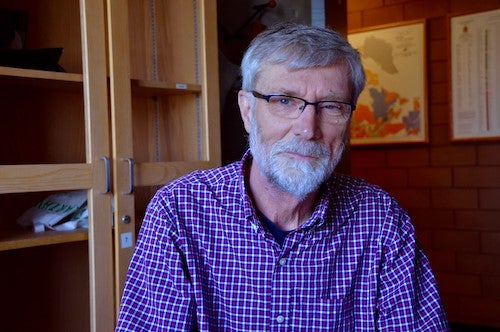
This tribute was jointly prepared by colleagues in the Department of Political Science and the Institute on Globalization and the Human Condition at McMaster University and the Department of Political Science at the University of Waterloo. A memorial event will be organized and announced soon.
On Friday March 24, 2023, Will Coleman passed away at St. Joseph’s Hospital in Hamilton. He will be remembered by friends, colleagues, and students as deeply ethical, academically innovative and fearless, a supportive and collaborative researcher, an exceptional teacher, and a very kind and generous friend.
Will joined the Department of Political Science at McMaster University in 1977. He founded the Institute on Globalization and the Human Condition (IGHC) and became its first director in1998. In 2003, Will’s extraordinary contributions to teaching, scholarship, and service were recognized by McMaster University when it awarded him the title of Distinguished University Professor. In 2009 he left McMaster to join the Department of Political Science at University of Waterloo and the Balsillie School of International Affairs as the CIGI Chair in Globalization and Public Policy. That same year, his stature as one of the top scholars in Canada would be recognized with his election as a Fellow of the Royal Society of Canada. Among the numerous honours and distinctions that marked his career, Will cherished his appointment as Shakorihonnién:ni (Associate Professor), Deyohaná:ge (Indigenous Knowledge Centre) at Six Nations Polytechnic, in recognition of his collaborative work with Indigenous Peoples. In 2015, he became University Professor, which is awarded only to the most distinguished and influential scholars working at the University of Waterloo.
Will was a prolific writer and institution builder with a ground-breaking and strongly collaborative approach to research. His published work covered a range of topics, including the independence movement in Quebec, Canadian public policy, business-government relations, global health, agricultural policy, Indigenous governance, and financial regulation. His scholarship is not just remarkable for its depth but also for its breadth. One of his most outstanding contributions has been in the arena of globalization, where his work significantly increased existing scholarly capacity to explore and to better understand the institutions of global governance and their effects. As the recipient of one of the most prestigious grants offered by Canada’s leading research funding agency — a Major Collaborative Research Initiative — for his project Globalization and Autonomy, Will was able to mobilize and motivate a dynamic international and multidisciplinary team of over 60 scholars leading to an extraordinary collection of published work, culminating in the integrative 9-volume Globalization and Autonomy Series. Colleagues and students who were involved in these initiatives have been deeply appreciative of the intellectual community that they constituted.
At the undergraduate level, Will was the founder and Director of the Theme School on Globalization, Social Change and the Human Experience at McMaster from 1998 to 2002. He was instrumental in the launch of IGHC’s MA in Globalization in 2004. Beginning in 2011, Will served as the Director of the MA in Global Governance as well as the Director of the Joint PhD Program in Global Governance at the University of Waterloo and the Balsillie School of International Affairs. These innovative undergraduate and graduate programs were among the first in North America to focus exclusively on globalization and global governance and his leadership helped to attract top students to each of them.
Will was also an extraordinarily passionate and committed teacher. During his time at McMaster, he regularly volunteered to teach large introductory Political Science classes and it was a common sight to see him spending significant amounts of time giving one-on-one advice to undergraduate students. In his last years at the University of Waterloo, he chose to teach large undergraduate classes in Canadian Politics and consistently received the highest evaluations from his students. He was also a magnet for masters and doctoral students and postdoctoral fellows who always appreciated his wise counsel, patience, and unwavering support. Many went on to co-author with him articles in leading journals and chapters in important books. His numerous teaching awards attest to his deep and abiding commitment to education, including the 2002 President’s Award for Educational Leadership at McMaster University, the Ontario Council of University Faculty Associations teaching award in 1997, the 3M Teaching Fellow awarded by the Society for Teaching and Learning in Higher Education in 1994, and MSU Teaching Awards in 1980/81, 1985, and 1986.
Will Coleman’s colleagues, students, and staff at McMaster University, the University of Waterloo, and the Balsillie School of International Affairs will be forever grateful to him for his tremendous leadership, intellectual generosity, and kindness of spirit.
Get onboard with this guide to engaging new talent
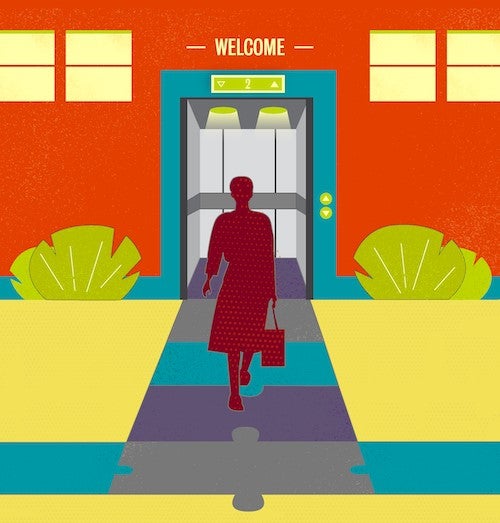
A message from Co-operative and Experiential Education (CEE).
Successfully onboarding new employees begins before they even walk through the door and can result in better work performance and organizational commitment.
In Co-operative and Experiential Education’s research-backed Guide to refreshing your onboarding program: The most effective tactics to engage new talent, you will learn how to develop an onboarding program that sets up new employees for success and fosters a culture that prepares your organization for the future of work.
Download the onboarding guide now.
Please note: The primary audience for this onboarding guide developed by CEE is co-op employers and the research subjects studied in this report were co-op students. This report is not intended to represent the University of Waterloo's overall approach for onboarding new talent. Human Resources is currently reviewing onboarding procedures for new University of Waterloo employees.
Spring clean your health with employee wellness sessions
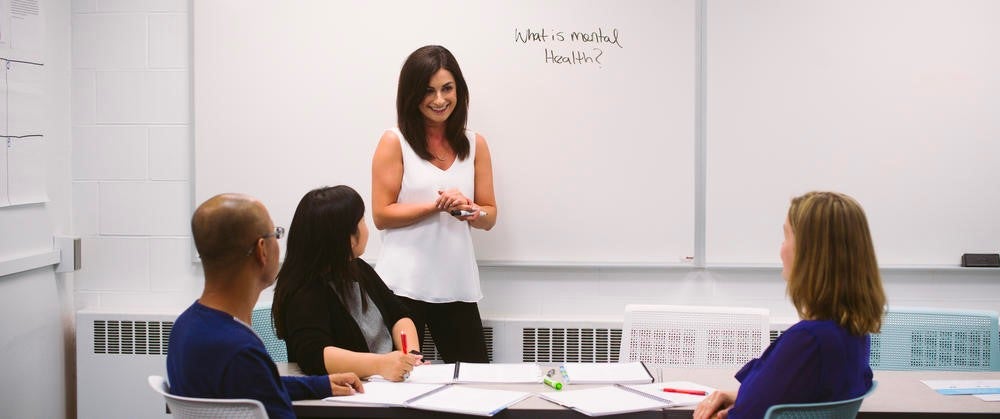
A message from Organizational and Human Development (OHD).
Spring brings milder temperatures, more sun, and wildlife sprouting everywhere. This alone can put an extra spring in your step. It's a time to look at your habits and make new ones that help you become a better version of yourself. The Healthy Workplace Committee, in partnership with Organizational and Human Development and Homewood Health has organized various wellness sessions for you to attend virtually over the winter and spring 2023 terms. These online learning events will be one-hour in length and will be facilitated through Microsoft Teams by Homewood Health, the provider of our Employee and Family Assistance Program (EFAP), for employees at the University.
There’s something for everyone, from positive parenting to stress busters to the emotional effects of retirement. Explore the descriptions and amazing timetable of wellness sessions being offered to see which dates and times fit with your schedule.
Space is limited to 40 participants per event, so register early to avoid disappointment. Registration for all sessions is open now in Portal.
Math invites you to go from AlphaGO to ChatGPT on April 12
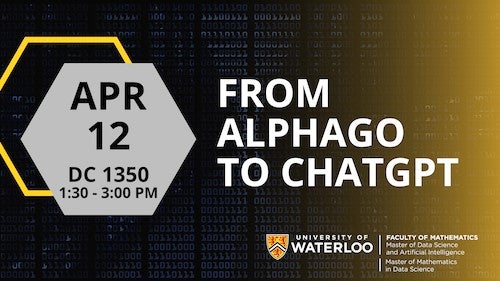
Please Join University of Waterloo expert in artificial intelligence, Professor Pascal Poupart, for a public talk in which he will describe the key technological advances in recent years which were behind, and ultimately facilitated, these breakthroughs.
In recent years, AlphaGo beat the best human players in the challenging game of Go, large language models such as ChatGPT and GPT-4 converse in a human way while displaying an unprecedented depth of knowledge, DALL-E 2 and Stable Diffusion create realistic images and art from natural language descriptions, the auto industry is rolling out AI-based autonomous driving systems, Alpha Fold 2 predicts the structure of over 200 million proteins to accelerate scientific research, and other large foundational models can predict the physical and chemical properties of compounds to accelerate the design of new materials.
While the industry often highlights the increasing size of their models (e.g., billions to trillions of parameters), this gives a false impression that simply throwing a lot of data to large computer clusters in order to train ever larger models is the key. However, important algorithmic advances were necessary to achieve those breakthroughs. Professor Poupart will explain the role that residual optimization and stochastic optimization played to enable deep learning. He will also discuss important advances in reinforcement learning, self-supervised learning and few-shot learning that significantly improved the quality of foundational models.
The success of AI has also led to new challenges in terms of explainability. While most models in advanced AI systems are difficult to interpret, Professor Poupart will also discuss recent advances in probing and conversational agents that can provide some degree of explainability.
This event is sponsored by the Faculty of Math Data Science Graduate Programs.
Register today for the event on April 12.
Using quantum technologies to make precise early-stage diagnoses
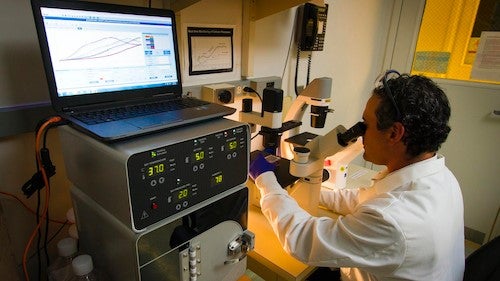
By Angelica Marie Sanchez. This is an excerpt of an article originally published on Waterloo News.
Quantum science is transforming the ways technology can lead to innovation in health by improving how doctors use tools to measure and determine a health diagnosis at an early stage before symptoms progress into long-term medical issues among patients.
“Quantum computing has a lot of real-world value in health, I am specifically interested in trying to use quantum devices such as sensors to measure these microscopic and nanoscopic properties in individual atoms and molecules,” says Connor Kapahi, a PhD student in Physics and Astronomy, who participated in this year’s Quantum for Health (Q4Health) Design Challenge led by Transformative Quantum Technologies (TQT).
“Applying quantum sensors to health care and giving practitioners better tools will dramatically improve a doctor’s ability to make a diagnosis and treat different health disorders.”
Kapahi and his team submitted their design idea of a new quantum technological device that may one day help prevent vision loss in older adults. Kapahi explains how macular degeneration is a retinal disorder and the leading cause of blindness among people over the age of 55-years-old. But while there are lot of treatments that are effective at slowing vision loss, there are currently no treatments that can reverse the effects once vision loss occurs.
The team’s cutting-edge design received the Gold Award along with $10K in funding to help further develop their research in a diagnostic tool which uses a structured state of light to create a pattern in a person's vision, a pattern that is only visible when the patient has a healthy macula. By developing a diagnostic tool that clinicians can add to their standard eye exam, doctors will then be able to detect macular degeneration in patients earlier on during routine visits and provide the specific treatment for patients with early-stage vision loss.
“It is great that our idea is getting recognition because research in general has a lot of ups and downs… really high-highs and really low-lows,” Kapahi says. “So, it is great to feel validated that the idea we have makes sense and that other people agree that this research is valuable and can work outside the lab.”
Kapahi and his team aim to use the $10K funding towards applying for a patent, while continuing to develop their research project into a startup to commercialize their diagnostic tool in the future. The team has already created a device that can only be used in a research environment and is currently being tested at the University of Waterloo.
“We spent the last few months testing the device on both healthy participants and participants with retinal disorders, and those early results are promising,” Kapahi says. “In the future, we hope to build a prototype of the diagnostic tool that can be used in clinical trials. In the meantime, we will continue testing patients with different retinal disorders. Hopefully, we can reach a point where this technology can be valuable to clinicians as part of their day-to-day practice.”
TQT held the Q4Health Design Challenge to search for new ways that quantum technologies can advance health. A total of eight teams of 29 Waterloo students, post-doctorates, faculty and staff submitted their design ideas proving how quantum technologies can improve healthcare by monitoring in both the near and long term.
“The Q4Health design challenge uncovered a broad array of applications where quantum technology can impact health, from improved detection of male infertility and diabetes to advancements in diagnostic tools used in pathology and eye health,” says Tracey Forrest, program director of TQT. “UWaterloo is an innovation leader, and this design challenge saw its multi-disciplinary strengths take centre stage with dozens of teams registering their interest from across campus leading to the formation of new collaborations and promising new research directions at the intersection of quantum and health. We are excited to see these teams push their ideas forward.”
Michael Reimer, a professor from the Faculty of Engineering, and his team received the Silver Award ($2.5K) for their design pitch in optical metamaterial single photon detectors to improve Raman spectroscopy for use in clinical pathology.
There's Something Rotten on the stage at Grebel
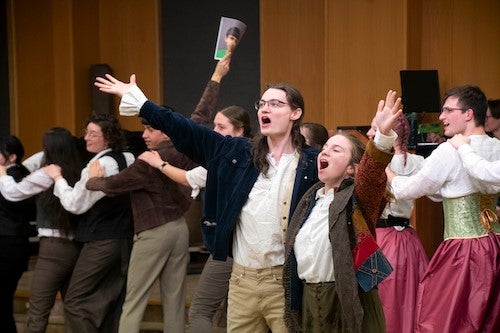
“It’s a Musical!”
Grebel's production of “Something Rotten” will take the stage this weekend at Theatre of the Arts in Modern Languages. Tickets are still available for purchase, so bring yourself, your friends, and family to enjoy this farcical show. Grebel’s all-student cast, crew, and music ensemble have been working tirelessly all semester to bring this Broadway show to life, right here at UWaterloo. You won’t want to miss it!
In this musical comedy, brothers Nick and Nigel Bottom are playwrights stuck in the shadow of William Shakespeare. To save their floundering theatre troupe, they hire an eccentric soothsayer who predicts that the future of theatre is… the Musical! This show is jam-packed with Shakespearean and 20th-Century musical references.
The performances run from March 31 to April 2.
Link of the day
50 years ago: US troops withdraw from Vietnam
When and Where to get support
Students can visit the Student Success Office online for supports including academic development, international student resources, immigration consulting, leadership development, exchange and study abroad, and opportunities to get involved.
Instructors looking for targeted support for developing online components for blended learning courses, transitioning remote to fully online courses, revising current online courses, and more please visit Agile Development | Centre for Extended Learning | University of Waterloo (uwaterloo.ca).
Faculty, staff, post-doc and graduate student instructors can find upcoming teaching and learning workshops, self-directed modules and recordings of previous events on Centre for Teaching Excellence Workshops and Events page.
Instructors can access the EdTech Hub to find support on Waterloo’s centrally supported EdTech tools. The Hub is supported by members of IST’s Instructional Technologies and Media Services, Centre for Teaching Excellence, Centre for Extended Learning and subject matter experts from other campus areas.
Supports are available for employees returning to campus. Visit IST’s Hybrid Work and Technology guidelines and workplace protocols to assist with the transition.
Students with permanent, temporary and suspected disabilities and disabling conditions (medical conditions, injuries, or trauma from discrimination, violence, or oppression) can register with AccessAbility Services for academic accommodations (classroom accommodations, testing accommodations, milestone accommodations).
Instructors can visit AccessAbility Services' Faculty and Staff web page for information about the Instructor/Faculty role in the accommodation process. Instructors/Faculty members are legally required to accommodate students with disabilities. AccessAbility Services (AAS) is here to help you understand your obligations, and to offer services and resources to help you facilitate accommodations.
Did you know that the Writing and Communication Centre offers many in-person and virtual services to support you with any writing or communication project? This term we've added The Write Spot: a new student space in South Campus hall, complete with bookable workspaces, drop-ins with our peer tutors, and free coffee and tea. We also have one-to-one appointments with our writing and communication advisors and peer tutors, email tutoring for grads and undergrads, drop-ins at Dana Porter Library, online workshops, writing groups, English conversation practice, and even custom in-class workshops. For any communication project, the Writing and Communication Centre is here to support you.
Research Ethics: Find yourself with an ethical question, unsure if your work requires an ethics review, or need advice about putting together a research ethics application? Reach out to one of our friendly staff by booking a consultation or email us with your questions.
Co-op students can get help finding a job and find supports to successfully work remotely, develop new skills, access wellness and career information, and contact a co-op or career advisor.
The Centre for Career Action (CCA) has services and programs to support undergrads, grad students, postdocs, alumni, and employees in figuring out what they value, what they’re good at, and how to access meaningful work, co-op, volunteer, or graduate/professional school opportunities. Questions about CCA's services? Live chat, call 519-888-4047, or stop by our front desk in the Tatham Centre 8:30 a.m. to 4:30 p.m., Monday to Friday.
Drop-in to in-person Warrior Study Halls on Thursdays from 5:00 p.m. to 6:30 p.m. in DC and DP. Join a Peer Success Coach to set goals and work independently or in groups each week.
Renison's English Language Institute continues to offer virtual events and workshops to help students practice their English language skills.
If you feel overwhelmed or anxious and need to talk to somebody, please contact the University’s Campus Wellness services, either Health Services or Counselling Services. You can also contact the University's Centre for Mental Health Research and Treatment. Good2Talk is a post-secondary student helpline available to all students.
The Library is here to help, both in person and online. Our spaces are open for access to book stacks, study spaces, computers/printers, and the IST Help Desk. For in-depth support, meet one-to-one with Librarians, Special Collections & Archives and Geospatial Centre staff. Visit the Library’s home page to access our online resources for anywhere, anytime learning and research.
The Faculty Association of the University of Waterloo (FAUW) continues to advocate for its members. Check out the FAUW blog for more information.
The University of Waterloo Staff Association (UWSA) continues to advocate for its members. Check out the UWSA blog for more information.
The Office of Equity, Diversity, Inclusion & Anti-racism (EDI-R) works with students, faculty and staff across campus to advance equity and anti-racism through evidence-based policies, practices and programs. If you have a concern related to anti-racism and/or equity, please complete our intake form.
The Sexual Violence Prevention and Response Office (SVPRO) supports all members of the University of Waterloo campus community who have experienced, or been impacted, by sexual violence. This includes all students, staff, faculty and visitors on the main campus, the satellite campuses, and at the affiliated and federated Waterloo Institutes and Colleges. For support, email: svpro@uwaterloo.ca or visit the SVPRO website.
The Office of Indigenous Relations is a central hub that provides guidance, support, and resources to all Indigenous and non-Indigenous campus community members and oversees the University's Indigenization strategy.
The Waterloo Indigenous Student Centre, based at United College, provides support and resources for Indigenous students, and educational outreach programs for the broader community, including lectures, and events.
WUSA supports for students:
Peer support - MATES, Glow Centre, RAISE, Women’s Centre - Click on one of the links to book an appointment either in person or online for the term.
Food Support Service food hampers are currently available from the Turnkey Desk 24/7 in the Student Life Centre. Drop-off locations are also open again in SLC, DC, DP, SCH, and all residences.
Co-op Connection all available online.
Centre for Academic Policy Support - CAPS is here to assist Waterloo undergraduates throughout their experience in navigating academic policy in the instances of filing petitions, grievances and appeals. Please contact them at caps@wusa.ca.
WUSA Student Legal Protection Program - Seeking legal counsel can be intimidating, especially if it’s your first time facing a legal issue. The legal assistance helpline provides quick access to legal advice in any area of law, including criminal. Just call 1-833-202-4571.
Empower Me is a confidential mental health and wellness service that connects students with qualified counsellors 24/7. They can be reached at 1-833-628-5589.
GSA-UW supports for graduate students:
The Graduate Student Association (GSA-UW) supports students’ academic and social experience and promotes their well-being.
Advising and Support - The GSA advises graduate students experiencing challenges and can help with navigating university policies & filing a grievance, appeal, or petition.
Mental Health covered by the Health Plan - The GSA Health Plan now has an 80 per cent coverage rate (up to $800/year) for Mental Health Practitioners. Your plan includes coverage for psychologists, registered social workers, psychotherapists, and clinical counselors.
Dental Care - The GSA Dental Plan covers 60 to 70 per cent of your dental costs and by visiting dental professionals who are members of the Studentcare Networks, you can receive an additional 20 to 30 per cent coverage.
Student Legal Protection Program - Your GSA fees give you access to unlimited legal advice, accessible via a toll-free helpline: +1-833-202-4571. This advice covers topics including housing disputes, employment disputes, and disputes with an academic institution.
The Graduate House: Open Monday to Tuesday 11:30 a.m. to 7:00 p.m. and Wednesday to Friday 11:30 a.m. to 9:00 p.m. We’re open to all students, faculty, staff, and community members. The Graduate House is a community space run by the GSA-UW. We’re adding new items to the menu. Graduate students who paid their fees can get discounts and free coffee.
When and Where
Fitness and Personal Training - Registrations opened January 5 this winter with Personal Training and Small Group Training as well as a Free Warrior Workout Program.
Waterloo Warriors Youth Camps. Spring and Summer camps available for Boys and Girls ages 5-18. Baseball, Basketball, Football, Volleyball, Hockey and Multi-Sport and Games. Register today.
Student Health Pharmacy in the basement of the Student Life Centre is now offering Covid booster shots (Pfizer and Moderna) and flu shots. Call 519-746-4500 or extension 33784 for an appointment. Walk-ins always welcome.
Designing for Disability and Accessibility, Thursday, March 30, 2:00 p.m. to 3:15 p.m., the Games Institute, EC1.
Balinese Gamelan Ensemble Concert, Saturday, April 1, 7:30 p.m., Humanities Theatre. Free admission.
Prime Time Jazz: UWaterloo Jazz Ensemble, Sunday, April 2, 2:00 p.m., Great Hall (room 1111) at Conrad Grebel University College. $5 students/$10 general, tickets available at the door, reception to follow.
Karlsruhe Institute of Technology (KIT) presentation by Dr. Klaus Rümmele, Tuesday, April 4, 10:00 a.m., EC5 – GEDI Boardroom.
Board of Governors meeting, Tuesday, April 4, 1:30 p.m., NH 3407.
PhD oral defences
School of Pharmacy. Wajd Alkabbani, “The associations between insulin, hypoglycemia, and dementia: Combating threats to internal validity in a series of population-based cohort studies.” Supervisor, Dr. J.M. Gamble. Please visit the Faculty of Science Thesis Submission Notices website for details on requesting a copy. Oral defence Wednesday, April 12, 9:30 a.m., remote via MS Teams.
Physics and Astronomy. Ramy Tannous, “Advancing the robustness of polarization and time bin quantum key distribution for free-space channels.” Supervisor, Dr. Thomas Jennewein. Please visit the Faculty of Science Thesis Submission Notices website for details on requesting a copy. Oral defence Thursday, April 13, 2:30 p.m., Quantum Nano Centre (QNC) Room 1201.
Computer Science. Yuhao Dong, "Themelio: a new blockchain paradigm." Supervisor, Raouf Boutaba. Thesis available from MGO - mgo@uwaterloo.ca. Oral defence Friday, April 14, 10:00 a.m., online.
Applied Mathematics. Julien Smith-Roberge, "Microcolony Dynamics: Motion from Growth, Order, and Incompressibility." Supervisor, Brian Ingalls. Thesis available from MGO - mgo@uwaterloo.ca. Oral defence Friday, April 14, 10:00 a.m., online and MC6460.